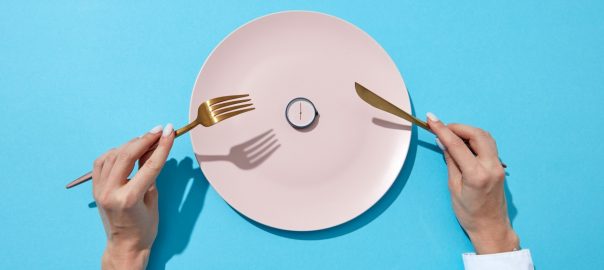
Intermittent Fasting – Can It Help Weight Loss?
Intermittent Fasting – Is It Worth It?
Are you thinking about trying intermittent fasting? Here’s everything you need to know before you get started.
Intermittent fasting can seem daunting at first, but once your body gets into the rhythm of it, there are a lot of potential benefits. These include higher energy levels, improved brain function, weight management and even reduced sugar cravings – a common experience when starting a ketogenic or low carb diet. Fasting like this can also help regulate insulin levels so it is a good option for diabetics. Let’s go deeper into how intermittent fasting can provide these benefits:
Weight Loss
This is usually the most popular goal when choosing to intermittent fast because it is a simple and effective way to lose some extra weight. When you fast, your body will naturally use up available stored glucose and then transition into burning stores of fat – this is how the weight loss occurs. If you’re looking to burn fat, fasting is one tried and true way to get rid of it. Note that it can be dangerous to fast for too long, but intermittent fasting is the perfect solution that still allows you to get your favourite meals in during the day.
Cellular Detox
The cells in your body naturally accumulate waste, which can interfere with healthy cellular function. Intermittent fasting allows your body more time to remove this waste and you won’t generate any additional waste in the meantime.
Healthy Aging
Intermittent fasting can protect the cardiovascular system and help manage blood sugar levels, which can prevent a number of diseases with later life onsets. Fasting has also been shown to promote tranquility which can reduce the aging effects of stress on the body.
We are not recommending intermittent fasting as a long-term lifestyle, but it can certainly help with specific short-term goals. Intermittent fasting even just once or twice a week has been shown to have significant health benefits.
What is Intermittent Fasting?
Intermittent fasting is an eating pattern that cycles between periods of fasting (not eating) and periods of eating. This means you consume all of your daily calories within a shortened time window, typically 6-10 hours of the day. It is fairly simple and highly rewarding.
Here is a breakdown of what 24 hours of intermittent fasting might look like:
- Stop eating around 8:00pm the night before.
- Go to sleep! (Sleep is a natural fasting period.)
- Skip breakfast the next day.
- Eat your first meal of the day in the early afternoon (12:00-2:00pm).
- Eat 1-2 more meals and stop eating at 8:00pm again.
- Repeat!
The times above can obviously be adjusted to your lifestyle and how long you can comfortably go without eating.
If you struggle with skipping breakfast, try some of these tips:
- Exercise when you wake up to kill time and work up an appetite.
- Drinking an appetite suppressant (make sure it’s zero calories), such as black coffee or tea. You could add cinnamon or nutmeg to your coffee for a little extra flavour, or even a zero-calorie natural sweetener!
- Drink water. It’s very important to stay hydrated during fasting periods.
The good thing about intermittent fasting is that when you shorten your eating window, you tend to consume less calories in a day than you would if you began eating early in the day because you will need less snacks to keep you satiated between spread-out mealtimes. This is another way that intermittent fasting can help with weight loss.
Not eating in the evening is also essential to this process. It might be hard to resist snacking before bed, but it can actually improve your digestion and sleep quality if you resist eating 1-2 hours before bed.
Bulletproof Intermittent Fasting: Debunked!
A lot of people on a ketogenic diet may wonder if they can consume bulletproof coffee in the morning if they are intermittent fasting. Let’s go deeper:
What is bulletproof coffee?
Bulletproof coffee is an emulsion of coffee and MCT oil, butter or full fat cream. Therefore, it has a very high fat content and low to no carbs.
Will bulletproof coffee break your fast?
The short answer is yes – drinking bulletproof coffee in the morning will break your fast, which is not a good thing if you are trying to make it until lunchtime. This is because it provides an additional source of fuel for your body, much like eating food. If your goal is weight loss, then having bulletproof coffee is not a good idea. Instead of burning stored fat, your body will use the ketones produced from drinking bulletproof coffee (specifically the MCT oil and cream) as a fuel source instead.
The Role of Caffeine During Intermittent Fasting
Although bulletproof coffee is a no-go, black coffee has actually been shown to enhance the benefits if intermittent fasting, especially if you are on a keto diet. This is because caffeine has been shown to support the production of ketones and help stabilize blood sugar levels.
Tea Can Improve Your Fasting Experience
Tea has also been shown to help manage and even make intermittent fasting more enjoyable! Here’s how tea can enhance the benefits of intermittent fasting:
- It helps increase satiety
Green tea has been proven to support healthy ghrelin levels – a hormone that is responsible for feelings of hunger. Stabilizing levels of ghrelin can alleviate hunger pangs and other feelings of discomfort that can occur when you first start fasting.
- Promotes a state of “calm energy”
The caffeine from tea is unlike that found in coffee. In comparison, tea can promote a more focused awareness and you won’t get the jitters. Tea also provides more sustained energy so you won’t experience a crash that can often occur when you drink coffee. In addition, many teas promote feelings of calmness, tranquility and ease which can help with any hunger-related mood swings.
- Supports cell health
Tea is a powerhouse when it comes to antioxidants. The polyphenols in tea help your body fight off free radicals which can in turn leave you feeling energized, support gut health and digestion, improve your mental focus and even make your skin glow!
So, which types of tea are best for intermittent fasting? Here’s a few that we recommend:
- Green tea – Packed with potent antioxidants and ghrelin-stabilizing compounds, green tea is a great option for whenever you feel hunger pangs or want an immune boost.
- Black tea – Did you know black tea leaves are really just fermented green tea leaves? This means it is a prebiotic – great for promoting gut health! Black tea also contains higher levels of caffeine if you need a bigger boost in the morning to get your day started.
- Ginger tea – Ginger is known for its ability to alleviate nausea and it can also increase satiety. This is a great one to have after dinner to help with digestion and prevent late night snacking!
- Hibiscus tea – Naturally caffeine-free, hibiscus tea is praised for its skin benefits and vitalizing antioxidant content. It tastes light and fruity so it’s perfect in place of a sweet dessert.
To unlock the full antioxidant benefits of tea, it is recommended to drink a minimum of 3 cups of high-quality tea per day. But be prepared to make an investment in higher quality teas because some of the inexpensive teas often use improper methods of processing that can strip away the original nutrients in the tea leaves, or they’ve been sitting on the grocery aisle shelves for much too long.
Here are some other tips for tea brewing to get the most out of your cup:
- Don’t use boiling hot water (let it cool after it reaches boiling point) or try cold brewing your tea. This is easier than it sounds – but it takes a little longer since heat normally speeds up the steeping process. The good thing is you can make a big batch that will last you at least a couple of days. A cold brewed cup of tea contains 2 to 3 times the antioxidants of a hot brewed cup! This means you actually have to drink less in order to get the same benefits as 3 hot brewed cups per day.
- Cover the top of your mug while your tea steeps to make sure all the benefits stay inside your cup and don’t float away with the steam!
- Use a tea filter for loose leaf teas, some are disposable and biodegradable. Great for making cold brew or tea on the go!
Stay Connected
If you have tried intermittent fasting, share your experience and tips with us on Facebook or tag us on Instagram. We also love to stay connected with our Weekly Newsletters for updates on the latest products and special sales. Also, please leave us a Google Review with your Low Carb Grocery experiences!






